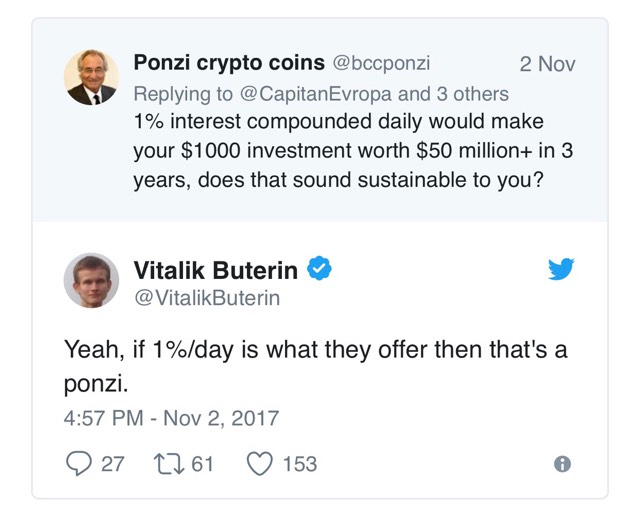Latest news about Bitcoin and all cryptocurrencies. Your daily crypto news habit.

Run-ups of the kind bitcoin is having in price and valuation make fertile ground for scams. Scams are valuable and very teachable moments. Skin in the game, by having plunked hard-earned cash down to see a return on investment, means vigilance and due diligence are musts.
Also read: GAW/Paycoin CEO Josh Garza Held Liable for $9 Million USD for Wire Fraud
Scams Immediately Offend Morality
Scams, taking advantage of people who trusted in a business’ integrity, are not okay. I will not for a second endorse such ways of doing business.
However, fraudulence is both an art and a science. It is worthwhile for investors and those enthusiastic about bitcoin to examine bad actors in our midst. We do well by understanding their techniques. We do better by publicizing them in hopes of preparing the next person who might come across such an offer.
Scams are not coins or projects you personally find abhorrent or objectionable. Though it might be true, these are sometimes necessary but never sufficient conditions to label something a scam. If that were the case, bitcoin would already be dust. Want to guess how many times a day someone who works in the ecosystem reads or hears the word “scam?”
Instead, the kind of efforts discussed here can be considered circumstantial, as in maybe all the facts are not in yet. Important too, perhaps some of the people involved were not privy to certain amounts of information — it’s often true in these matters the last ones to know are zealous believers.
Bitconnect
Can there be a multi-billion dollar fraud, one listed and quantified right before our eyes? Bitconnect is a pretty great example of yes, yes there can. In about a year’s time it has become a coin and investment platform to watch, but not for the reasons its elusive founders and maintainers might want.
Bitconnect reads almost immediately as if the great, great grandchildren of Charles Ponzi have taken to the old man’s craft. Double-digit returns monthly! Guaranteed! What could possibly go wrong!
The rather odd fact here is this might actually be possible, for a short time. Again, prices are skyrocketing, saving Bitconnect from sure immediate disaster.
Maybe there is a trading bot they’ve concocted, one capable of sloshing through 2017’s frothy coin market. Simply download their proprietary, ”risk-free” software and watch the magic happen. At just above the 10,000 USD investment mark, they’ll credit investors with a .25 percent return in a four month period, adding a cool 9,000 on top of the principal. Sign me up!
The referral program is a classic pivot on which Ponzi works his wonders. Let’s just say each gets a percentage of the newer investors’ principal, which essentially bankrolls older returns in an otherwise sane market environment. Prices and mania are clouding this truism at the moment. Bitconnect lives in that confusion.
Such people who innocently got-in early on a Bitconnect scheme could be ginned up on crazy return schedules. A great many of them, I assume, have little-to-no investment experience. It is a perfect storm.
Onecoin
Better known and understood is Onecoin. I’ve yet to find anyone who believes it to be legitimate, and so I won’t waste too much time deep-diving.
Parked in Dubai and Belize, about as far away geographically from one another as is humanly possible, it tends to fit well with our friend Ponzi. It bills itself as an education outfit, promoting investment.
For small to many tens of thousands of dollars, Onecoin offers token packages, which can then be used to mine onecoins. The packages are cut and pasted old hat investment advice.
The company is sure to stress it doesn’t offer cryptocurrency so much as it does literature. Meetings often tend to breeze over materials, however, and speakers urge cryptos. For a short time onecoins were exchanged for Euros in a private market. Packages purchased determined coin access. The market itself artificially limited coins, making them appear scarce and more valuable. At random intervals, the market would be shut for maintenance, and once back online some orders and trades disappeared. Wallets and wire-transfers later, early adopters might have walked away with profit.
As of this writing, governments all over the world have pursued Onecoin. Sadly, it is precisely this type of fraud that governments use to inform broader decision-making on legitimate coin offerings and exchanges. Needless to point out, governments do not need more excuses to limit cryptocurrencies’ obvious threat to their banking systems.
Bitpetite
Very recently, Bitpetite vanished. Gone too were its customers’ cash. It guaranteed massive three digit returns, falling on percentages such as 147, seemingly always a tell. For some reason, promising 150 percent seemed gratuitous, but that crooked number at the end adds to legitimacy, I guess.
The website flickered on and off for some time, and it’s getting pretty grim for those who relied on the company, as its social media platforms have all gone too.
The commonality here is grand promises, fast returns, guarantees. Learn from all three. Their lies, exposed, point to greater truths. Nothing of their promises exist in the real world, and the sooner we learn that lesson the better we will all be.
How do you think bitcoiners should be made aware of scams? Tell us in the comments below!
Images courtesy of: Pixabay, Twitter, Bitconnect, Onecoin.
At Bitcoin.com there’s a bunch of free helpful services. For instance, check out our Tools page!
The post A Closer Look at How Three of the Biggest Scamcoins Lure Its Investors appeared first on Bitcoin News.
Disclaimer
The views and opinions expressed in this article are solely those of the authors and do not reflect the views of Bitcoin Insider. Every investment and trading move involves risk - this is especially true for cryptocurrencies given their volatility. We strongly advise our readers to conduct their own research when making a decision.




